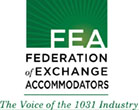These national, regional and state business and industry associations have commented in support of Section 1031 or in opposition to repeal over the past several years.
Section 1031 is a vital, cost effective and revenue neutral stimulant to the U.S. economy and to job creation and should not be repealed or modified under tax reform initiatives.
- ADISA, the Alternative and Direct Investment Securities Association (formerly REISA)
- American Farm Bureau Federation
- American Farmland Trust
- American Institute of Architects
- American Land Title Association
- American Mushroom Institute
- American Petroleum Institute
- American Seniors Housing Association
- American Sheep Industry Association
- American Soybean Association
- American Sugarbeet Growers Association
- Appraisal Institute
- Asian American Hotel Owners Association
- Building Owners and Managers Association International
- CCIM Institute
- Connecticut Bar Association
- Federation of Exchange Accommodators
- Iowa Farm and Land Chapter #2
- Iowa Soybean Association
- International Council of Shopping Centers
- Institute of Real Estate Management
- Land Trust Alliance
- NAIOP, the Commercial Real Estate Development Association
- NAREIT, National Association of Real Estate Investment Trusts
- National Apartment Association
- National Association of Home Builders
- National Association of Forest Owners
- National Association of REALTORS®
- National Association of Sate Departments of Agriculture
- National Association of Wheat Growers
- National Barley Growers Association
- National Cattlemen’s Beef Association
- National Corn Growers Association
- National Cotton Council
- National Council of Farmer Cooperatives
- National Milk Producers Federation
- National Peach Council
- National Pork Producers Council
- National Potato Council
- National Sorghum Producers
- National Sunflower Association
- National Turkey Federation
- National Multifamily Housing Council
- Peconic Land Trust
- Public Lands Council
- Real Estate Board of New York
- The Real Estate Roundtable
- REALTORS® Land Institute
- Society of Industrial and Office REALTORS®
- Southwest Council of Agribusiness
- Texas Association of Business
- The Conservation Fund
- The Nature Conservancy
- The Trust for Public Land
- United Egg Producers
- United Fresh Produce Association
- U.S. Apple Association
- U.S. Canola Association
- U.S. Chamber of Commerce
- U.S. Sweet Potato Council
- USA Rice Federation
- Western Growers Association
